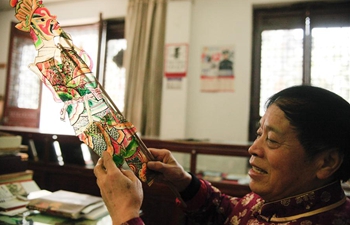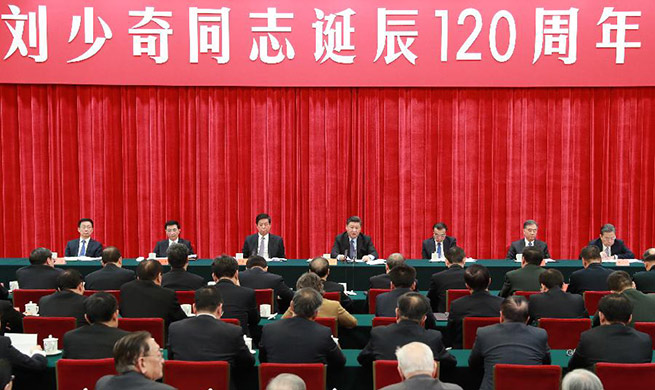PARIS, Nov. 24 (Xinhua) -- After last week's countrywide blockades, tens of thousands of people protested once again on Saturday in France to voice their anger over higher tax on fuel and weakening purchasing power, while the government stood firm on its plan.
Earlier in the day, 8,000 protesters converged in Paris, with 5,000 taking the Champs-Elysees Avenue waving tricolor flags and chanting "Macron, resign."
By 15:00 local time (1400 GMT), 81,000 demonstrators participated in the second round of social action across French cities, compared with 244,000 reported for the same period last week.
Violence erupted in Paris after the crowd tried to move to the Place de la Concorde, which is close to the National Assembly and the Elysee Palace, defying a police ban on protests in the capital's main avenue.
A group of protesters removed the cobblestones from the streets and took down construction barriers to form barricades, some of which were torched. They also threw projectiles at anti-riot police who responded with tear gas and water cannon to disperse the crowd.
A total of 35 individuals were arrested, 22 of whom were placed into police custody following the standoff, said Paris prefecture, adding that hundreds of far-right extremists had infiltrated the demonstration.
As tension remained flared in the capital's protest, violent clashes between police and protesters left eight wounded, including two gendarmes.
"The ultra-right is mobilized and is building barricades on the Champs-Elysees. They are progressively being neutralized and pushed back by police," Interior Minister Christophe Castaner said earlier in the day, pointing the finger at far-right leader Marine Le Pen for fuelling tension.
With no leader, the "Yellow Vests" movement, which got its name from the high visibility vests drivers keep in their cars, was created on social media, after several groups called for blockades and go-slow operations across the country to oppose higher fuel tax and diesel price, the most commonly used car fuel in France.
For more than a week, protesters have blocked highways in many regions, obstructing access to fuel depots, shopping centers and some factories.
Last Saturday, the movement drew 288,000 participants countrywide.
Despite the protests that may cost him his place at the Elysee Palace, President Emmanuel Macron, already on the hot seat due to contested reforms, said he would not back down on the fuel tax plans.
During a visit to Belgium earlier this week, Macron said "things do not happen spontaneously...(The energy transition) involves changing habits, and it's never easy."
"The government is currently facing protests. It's with dialogue that we can get out of that... with the ability to find both the right pace and the solutions on the ground," he responded.
Last week, Prime Minister Edouard Philippe announced a 500-million-euro (567 million U.S. dollars) plan to help motorists with the lowest incomes to shift to more environmentally friendly transport.
In a further effort to appease public anger, the head of state will lay out on Tuesday the country's ecological roadmap with which he hoped to implement a "fair" energy transition.
"We must constantly ... find new measures, new devices that allow to help the French," said Minister of Ecology Francois de Rugy.
As the government's financial aid falls short and treads water on people's disenchantment, "Yellow Vests" supporters have already been coordinating on social media to stage more nationwide blockades next month that may paralyze the eurozone's second power and the world's top tourism destination during Christmas festivities.
An Odoxa poll conducted on Nov. 21-22 and released on Friday showed that 77 percent of 1,004 respondents approved the movement. Two out of three French people called for prolonged social action to force Macron to reconsider the tax increase and take further move to improve household purchasing power, the pollster added.













